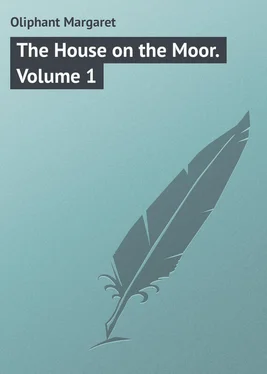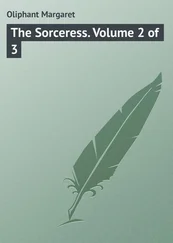Margaret Oliphant - The House on the Moor. Volume 1
Здесь есть возможность читать онлайн «Margaret Oliphant - The House on the Moor. Volume 1» — ознакомительный отрывок электронной книги совершенно бесплатно, а после прочтения отрывка купить полную версию. В некоторых случаях можно слушать аудио, скачать через торрент в формате fb2 и присутствует краткое содержание. Жанр: foreign_language, foreign_prose, на английском языке. Описание произведения, (предисловие) а так же отзывы посетителей доступны на портале библиотеки ЛибКат.
- Название:The House on the Moor. Volume 1
- Автор:
- Жанр:
- Год:неизвестен
- ISBN:нет данных
- Рейтинг книги:5 / 5. Голосов: 1
-
Избранное:Добавить в избранное
- Отзывы:
-
Ваша оценка:
- 100
- 1
- 2
- 3
- 4
- 5
The House on the Moor. Volume 1: краткое содержание, описание и аннотация
Предлагаем к чтению аннотацию, описание, краткое содержание или предисловие (зависит от того, что написал сам автор книги «The House on the Moor. Volume 1»). Если вы не нашли необходимую информацию о книге — напишите в комментариях, мы постараемся отыскать её.
The House on the Moor. Volume 1 — читать онлайн ознакомительный отрывок
Ниже представлен текст книги, разбитый по страницам. Система сохранения места последней прочитанной страницы, позволяет с удобством читать онлайн бесплатно книгу «The House on the Moor. Volume 1», без необходимости каждый раз заново искать на чём Вы остановились. Поставьте закладку, и сможете в любой момент перейти на страницу, на которой закончили чтение.
Интервал:
Закладка:
CHAPTER III
THERE were strange elements of incongruity in the scene presented by that dinner-table. Mr. Scarsdale sat at the head of the table, with his son and daughter at the sides, and Peggy behind his chair, erect and stately in his evening dress. All the furniture of the table, the linen, the silver, the china, were of the finest description, and in beautiful order; and strangely around this little centre of light gloomed the meagre unadorned walls, the homely furniture, the heavy hangings of the cheerless apartment, which, however, scarcely formed a greater contrast to the dainty arrangements of the table than Horace Scarsdale’s gray morning jacket, and disordered hair, did to the formal toilette of his father. Susan sat at Mr. Scarsdale’s right hand, in her clean collar. Her dress was very homely; but Susan, at seventeen, was one of those women who have a natural fitness for their place everywhere, and never fall out of harmony. Perhaps she was not over-sensitive by nature; at all events, she was not distressed by the silence of this meal, at which there was no conversation. It was their invariable custom, and Susan had seen no other family-table to make her aware of the misery of this. Horace was of another temper: everything was an offence to the unhappy lad; the silence galled almost beyond endurance; and when his father addressed him as he did always, with formal politeness, upon helping him to anything, the blood rushed to the young man’s cheeks with such sudden violence and force, that no one, who watched his countenance, could have been surprised to see him answer with some demonstration of passion. But he never did; he replied, in the stifled voice of rage, with thanks and formal courtesy. Thus they sat like two enemies, forced to civility by the circumstances of sitting at the same table, and together ate, as if it choked them, their unblessed bread. “Shall I help you to some soup?” asked Mr. Scarsdale, and Horace made a stubborn bow and said, “Thank you.” Neither spoke the other’s name, neither even looked in the other’s face – yet, by that strange magic of antagonism, which is as strong as love, were aware, instinctively, of every movement, almost of every sentiment, which influenced each other’s conduct for the moment. But they had this little duel all to themselves – Susan, dulled by habit, and knowing that it had always been so, observed it not – Peggy, behind her master’s chair, saw everything, and said nothing. Sometimes, indeed, an acute observer might have noticed that the faithful servant set down something on the table with an unnecessary emphasis, which answered, instead of words, to give her impatience vent, and which her master never failed to notice. Peggy, too, did not hesitate to interfere in the business of the table – to remark that Mr. Horace did not eat, and to recommend a particular dish to Miss Susan. Peggy’s dialect was rather a remarkable one, and difficult to identify. She was a North-countrywoman by birth, but had lived in many districts of England, and had taken up, with great impartiality and candour of mind, their different manners of speech. But Mr. Scarsdale, who had killed all natural utterance in his children, had no power over Peggy; he never even tried to restrain her. Her discourse ran on a cheerful chorus during the whole solemn period of dinner; and this it was, more perhaps than anything else, which prevented a positive outbreak between the father and the son.
“Young Master Roger, Miss Susan, dear, he’s agoin’ hoam,” said Peggy; “he’s got father and mother livin’ after all, as I hear say, and none so poorly off neither, for all his goin’ off in a despair wi’ talk o’ ’listin’. Natur’s a mystery, that’s for certain – to turn off a manchild upon a godfayther, and rather to ’list nor to go hoam! I dunno know which is worst if ye ask me. Stewed chicken, master, and done perfect, though I say it as should not; but I’m none so pleased with the peatoes. I’ll not have no more from the mill – they’re agoin’ in the disease. Wine? – this very minute, if I had the keys.”
Mr. Scarsdale brought forth the keys from his pocket; and, totally regardless of Peggy’s monologue, which ran on in further gossip, broke the silence of the table in his own person – a most portentous and unusual incident. He spoke without either addressing or looking at anyone, though it was, in fact, a question which he asked.
“There is, I believe,” observed Mr. Scarsdale, “a spare bedroom in the house?”
Peggy did not hear for the first moment, being taken aback by the unusual event; and Susan said, timidly, “Yes, papa,” taking the remark to herself.
“The door was open this very day, master,” said Peggy, when she recovered her surprise; “I judge you wur lookin’ with your own eyes what like it was; but the good of a spare bedroom in this house I would wish a wise woman to tell to me.”
Mr. Scarsdale made no response, but delivered himself of his further intelligence as though he heard her not. “I wish it to be put in order,” he said, briefly; “Colonel Sutherland arrives here on a visit, to-morrow.”
Even Horace was moved to a momentary start and look of surprise at his father’s immovable countenance, while Susan clasped her hands in spite of herself, and cried – “Oh! papa, is it my uncle?” with the most eager and joyful anxiety suddenly suffusing her face.
But Susan’s voice was drowned in Peggy’s more decided accents. “Master Edward!” cried Peggy, with a restrained shout of triumph – “blessings on his honest face! he never crossed a door but he brought comfort – and as handsome a man as eye could see, and the pleasantest gentleman to speak to that ever said good-morrow. So he’s Cornel now! – and well deserves it, I’ll be bold to say. Custard, master? – as light as a May breeze – and the very tarts you had in holiday times, when you were a boy. I had a thought of old times, and knew no reason – to be sure, it was for a forewarning of the news!”
Mr. Scarsdale thrust the china dish containing the tarts out of his way with an unusual expression of impatience. Then, recollecting himself, took it up and turned to Horace – that is to say, turned his head to him, without turning his eyes, as was his custom. “May I have the pleasure of helping you?” said the father, with a tone of suppressed bitterness. Horace put forth his plate immediately; Peggy’s harmless confectionery was evidently vexatious and annoying to Mr. Scarsdale, and his son took pains to express his enjoyment of it, and compliment Peggy on her handiwork. It was as rare an event to hear Horace’s voice at dinner as his father’s. The approaching event seemed to have loosed the tongues of both.
This little incident put an end to Peggy’s gossip; she removed the remainder of her tarts with a visible flutter of offence, and set down the wine on the table with double emphasis. When Peggy withdrew, Mr. Scarsdale took a book from his pocket, and set up a small folding reading-desk, which had been placed by his hand when the cloth was withdrawn. There he sat, with his glass of purple claret reflected in the shining mahogany, and the two tall, slender candles illuminating a little circle round him, and his head relieved against the dark curtains, which looked almost black in the feeble light. A line of magic drawn round him could not have screened him more completely from the other inmates of the room. Horace thrust his chair away rudely, and leaving it thus at a little distance from the table, went to the window and disappeared behind the curtains to look out on the night. Susan stole quietly round to the side of the table, and produced out of her big bag her evening work – an occupation dear to her heart, though it was only a patchwork quilt, the only fancy work that Susan knew; but before she sat down, withdrew her brother’s chair noiselessly to the side of the fire, where it looked human and companionable. Then silence, entire as if these three human creatures were statues, fell upon the room, where still Mr. Scarsdale sat at the shining table with its two lines of reflection, with the claret jug at his elbow, and his book supported on the reading-desk, and the glass before him half-full of purple wine. He turned the leaves at regular intervals, and went through them with mechanical gravity; but his ears were keen to every rustle of the curtain, and with all the virulence of domestic strife the mind of this singular father watched his son.
Читать дальшеИнтервал:
Закладка:
Похожие книги на «The House on the Moor. Volume 1»
Представляем Вашему вниманию похожие книги на «The House on the Moor. Volume 1» списком для выбора. Мы отобрали схожую по названию и смыслу литературу в надежде предоставить читателям больше вариантов отыскать новые, интересные, ещё непрочитанные произведения.
Обсуждение, отзывы о книге «The House on the Moor. Volume 1» и просто собственные мнения читателей. Оставьте ваши комментарии, напишите, что Вы думаете о произведении, его смысле или главных героях. Укажите что конкретно понравилось, а что нет, и почему Вы так считаете.












